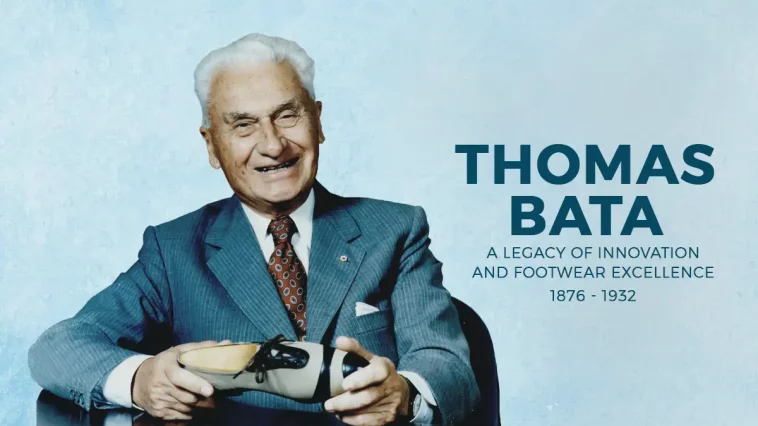Thomas Bata, a name synonymous with quality footwear and entrepreneurial success, is a remarkable figure in the world of business and fashion. His journey from a small Czech shoe manufacturer to the founder of the renowned Bata Shoe Company, a global footwear giant, is a testament to his vision, perseverance, and dedication to innovation. In this article, we delve into the life and accomplishments of Thomas Bata, a pioneer in the footwear industry.
Early Life and Beginnings:

Thomas Bata was born on September 17, 1914, in Zlín, Czechoslovakia (now the Czech Republic). He hailed from a family with a deep-rooted history in shoemaking. His father, Tomáš Baťa, Sr., was the founder of the Bata Shoe Company, which was established in 1894. The younger Thomas Bata inherited a passion for footwear from his family and a strong entrepreneurial spirit.
Thomas Bata’s early life played a significant role in shaping his entrepreneurial spirit and passion for the footwear industry. Here’s a more detailed exploration of this formative period:
2.1 Family Background:
Thomas Bata was born on September 17, 1914, into a family with a rich shoemaking heritage. His father, Tomáš Baťa, Sr., was the founder of the Bata Shoe Company, a modest shoemaking business that began in the late 19th century. The Bata family’s commitment to shoemaking and business innovation set the stage for young Thomas’s future endeavors.
2.2 Shoemaking Heritage:

Growing up in Zlín, Czechoslovakia (now the Czech Republic), young Thomas was immersed in the world of shoemaking from a very early age. His family’s small shoemaking workshop served as an early classroom where he learned the intricacies of crafting quality footwear. These early experiences instilled in him a deep appreciation for the craftsmanship and artistry of shoemaking.
2.3 Entrepreneurial Environment:
Within the Bata household, entrepreneurship was not just a business endeavor; it was a way of life. Thomas witnessed firsthand the challenges and rewards of running a family business. The entrepreneurial environment at home inspired him to dream big and envision the potential for growth and expansion in the world of footwear.
2.4 Education and Learning:
Thomas Bata’s education was influenced by his family’s shoemaking tradition. He attended school in Zlín, where he gained a solid foundation in both academic and practical skills. His educational experiences provided him with a well-rounded perspective that would later prove invaluable in running a successful business.
2.5 Early Exposure to Business:
As a young boy, Thomas occasionally accompanied his father to the Bata shoe factory. These visits exposed him to the inner workings of the business, from production processes to customer interactions. This early exposure sparked his curiosity and deepened his understanding of the shoemaking industry.
2.6 Inheriting a Legacy:
When Thomas’s father tragically passed away in a plane crash in 1932, the 17-year-old Thomas found himself thrust into a position of leadership within the Bata Shoe Company. He was tasked with upholding the family legacy and continuing the work that his father had started. This early responsibility marked a critical turning point in his life.
2.7 Fostering Innovation:
Determined to honor his father’s vision while also pushing the boundaries of innovation, Thomas Bata embarked on a journey to modernize and expand the family business. His vision extended beyond local markets, and he sought to transform Bata into a global footwear brand.
2.8 Visionary Leadership:
Thomas Bata’s early experiences, combined with his visionary leadership, set the stage for the remarkable transformation of the Bata Shoe Company into an international footwear giant. His ability to blend tradition with innovation and his commitment to quality would become the cornerstones of the company’s success.

In conclusion, Thomas Bata’s early life and beginnings laid a strong foundation for his future achievements in the footwear industry. His family’s shoemaking heritage, entrepreneurial environment, and early exposure to business instilled in him the values and skills necessary to lead the Bata Shoe Company into a new era of growth and innovation. Thomas Bata’s journey from a young boy in a shoemaking family to the head of a global footwear empire is a testament to his resilience, vision, and unwavering commitment to excellence.
Innovations in Shoemaking:

Thomas Bata’s tenure at the helm of the Bata Shoe Company marked a period of remarkable innovation in the shoemaking industry. He introduced numerous groundbreaking ideas and practices that set Bata apart from its competitors. Some of these innovations included:
- Factory System: Thomas Bata embraced the factory system of manufacturing, streamlining production processes and significantly increasing efficiency. This approach allowed Bata to produce high-quality shoes on a large scale.
- Retail Expansion: Under his leadership, Bata expanded its retail presence globally. The company established a vast network of Bata stores in various countries, making quality footwear accessible to people worldwide.
- Standardized Sizing: Bata was one of the pioneers in introducing standardized shoe sizing, ensuring that customers could easily find the right fit regardless of where they shopped.
- Affordability: Thomas Bata was committed to providing affordable footwear without compromising on quality. This commitment made Bata shoes accessible to a broad spectrum of consumers.
- Innovation in Materials: He explored innovative materials and production techniques to enhance the comfort and durability of Bata shoes. This commitment to research and development contributed to the brand’s reputation for quality.
Global Expansion:
Under Thomas Bata’s leadership, the Bata Shoe Company expanded its presence to over 70 countries, becoming one of the world’s largest footwear manufacturers and retailers. Bata stores became a familiar sight in cities across Asia, Europe, Africa, and the Americas. The brand’s commitment to quality and affordability resonated with consumers worldwide.
Certainly, let’s delve deeper into the aspect of “Global Expansion” within the context of Thomas Bata’s career and the Bata Shoe Company:
3.1 Early International Ventures:
Under Thomas Bata’s guidance, the Bata Shoe Company began its international journey in the early 1930s. The company expanded into neighboring countries in Europe, such as Poland, Yugoslavia, and Switzerland. These initial ventures laid the groundwork for Bata’s future international success.
3.2 Unique Retail Model:
A hallmark of Bata’s global expansion strategy was its innovative retail model. The company established its signature Bata retail stores in various countries. These stores offered a wide range of affordable, high-quality footwear for men, women, and children. The Bata store concept was designed to cater to the diverse needs and preferences of local customers while maintaining a consistent focus on quality.
3.3 Adaptation to Local Markets:
While Bata maintained its commitment to producing high-quality footwear, it also recognized the importance of adapting to local markets. Thomas Bata emphasized the need to understand the unique cultural, climatic, and fashion preferences of each market. This approach allowed Bata to offer products that resonated with local consumers.
3.4 Vast Retail Network:
Bata’s global retail network expanded rapidly. By the mid-1930s, the company had established hundreds of stores across Europe. This growth continued throughout the 20th century, with Bata stores becoming a familiar sight in cities and towns worldwide.
3.5 Technological Innovation:
Bata’s commitment to innovation extended to its manufacturing and distribution processes. The company leveraged cutting-edge technology to enhance production efficiency and product quality. This commitment to innovation enabled Bata to meet the demands of an expanding global market.
3.6 Market Entry in Diverse Regions:
Bata’s global expansion was not limited to Europe. The company entered diverse regions, including Asia, Africa, and the Americas. This global reach allowed Bata to tap into emerging markets and establish a presence in countries with varying economic conditions and consumer behaviors.
3.7 Localization Efforts:
In each new market, Bata made efforts to localize its operations. This involved hiring local talent, sourcing materials locally when possible, and tailoring product offerings to meet the specific needs of the region. Localization efforts helped Bata build strong relationships with local communities.
3.8 Impact on Footwear Accessibility:
Bata’s global expansion had a profound impact on the accessibility of quality footwear. The company’s stores brought affordable, well-crafted shoes to people in regions where such products had been scarce. This contributed to improved foot health, comfort, and style for millions of individuals around the world.
3.9 Philanthropic Initiatives:
Bata’s global presence also facilitated the company’s philanthropic efforts. The Bata Children’s Program, founded in 1964, provided educational and healthcare support to children in various countries. These initiatives reinforced Bata’s commitment to the well-being of the communities it served.
In conclusion, Thomas Bata’s visionary leadership and commitment to global expansion transformed the Bata Shoe Company into a household name across the globe. The company’s ability to adapt to local markets, offer affordable yet quality footwear, and leverage technological innovation contributed to its success. Bata’s global footprint not only shaped the footwear industry but also made quality shoes accessible to people from all walks of life in diverse corners of the world. Thomas Bata’s legacy as a global footwear pioneer endures, reminding us of the enduring impact of visionary entrepreneurship.
Legacy and Philanthropy:
Thomas Bata’s contributions extended beyond the business realm. He was a philanthropist and believed in giving back to the communities where Bata operated. The Bata Children’s Program, founded in 1964, aimed to support children’s education and well-being in numerous countries. This program continues to make a positive impact on the lives of young people around the world.
Honors and Recognition:
Throughout his life, Thomas Bata received numerous awards and honors in recognition of his contributions to the footwear industry and global business. His legacy endures not only in the success of the Bata Shoe Company but also in the enduring impact of his innovative ideas and commitment to quality.
Conclusion:
Thomas Bata’s life and career exemplify the transformative power of innovation and a commitment to excellence. He turned a family shoemaking business into a global footwear empire that continues to thrive today. His dedication to providing quality, affordable shoes to people from all walks of life left an indelible mark on the world of fashion and business. Thomas Bata’s legacy lives on, reminding us of the enduring value of vision, innovation, and a strong sense of purpose in the world of entrepreneurship.



Comments